#TBT Seiko 7002 Diver – A Neo-Vintage Classic
Welcome to my nightmare, otherwise known as the Seiko 7002 diver. I’m only half joking, but do realize that this article and the watch you see here is akin to the third part of a trilogy where, up until the last episode, it looked as if the protagonist was destined to fail. And just when the hero (that would be me) slays the demon, the credits roll and we find out that the demon has a little brother. Confused yet? In watch terms, it took me three tries at buying 7002’s to finally get a good seemingly original one. And then, during the photo shoot for this story, I dropped it onto a granite boulder from at least 2 meters high…sigh. Thankfully, the watch is fine aside from a nice scar above its crown, but I digress. Let’s talk about the Seiko 7002 diver, its place in Seiko diver history and in general watch culture.
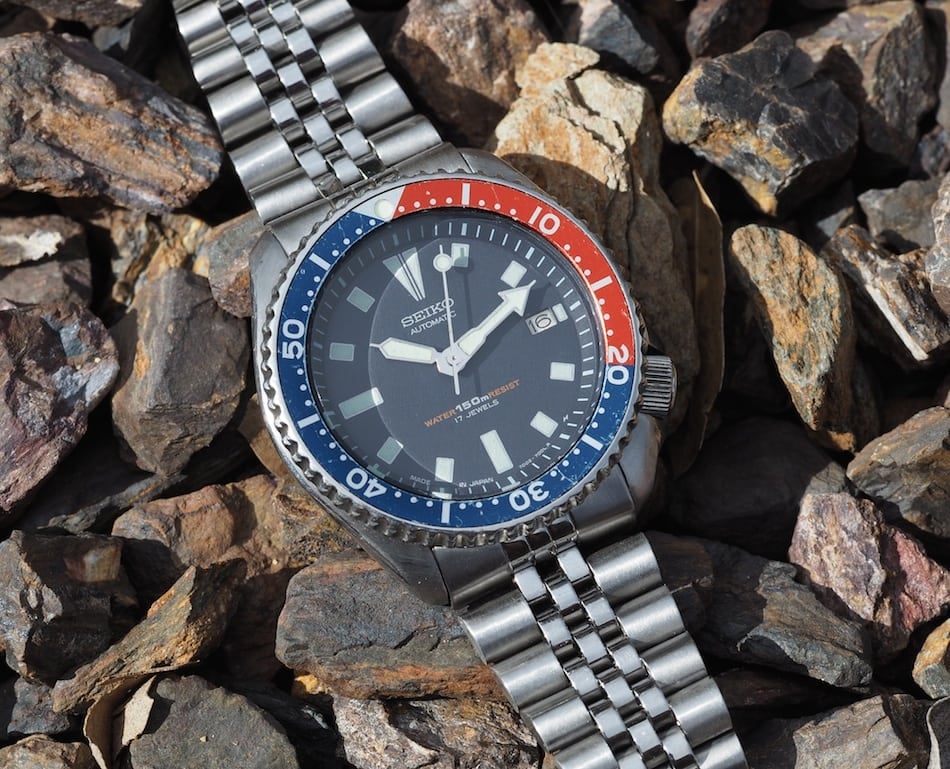
We’ve not really covered the Seiko 7002 diver in depth here on Fratello Watches. In fact, I stopped just short of mentioning the 7002 in an article cataloguing all of the vintage Seiko divers because I focused on pieces introduced up until roughly 1980. Therefore, when it comes to automatic divers, we stopped with the Seiko 6309 “Turtle”. The Turtle was made from 1976 until 1982. In 1982, Seiko introduced the 6309-7290, which carried over the movement complete with day/date function, but brought in a slimmer case that’s still with us today in the form of the iconic SKX007. If you’re keeping track, this case style actually debuted on a quartz diver in the late 70’s, the beloved 7548. Anyhow, in 1988, Seiko decided to end production of the 6309 series of movements and replaced this watch with the Seiko 7002 and its 7000-series of movements. We’ll never truly know why Seiko made the switch, but a look at the movement shows stamped versus machined parts, a lot more plastic, and less expensive finishing. Yes, it seems as if Seiko was under cost pressure. The day function was also a casualty of this movement introduction, but more on that later. The 7002 was produced from 1988 until 1996.
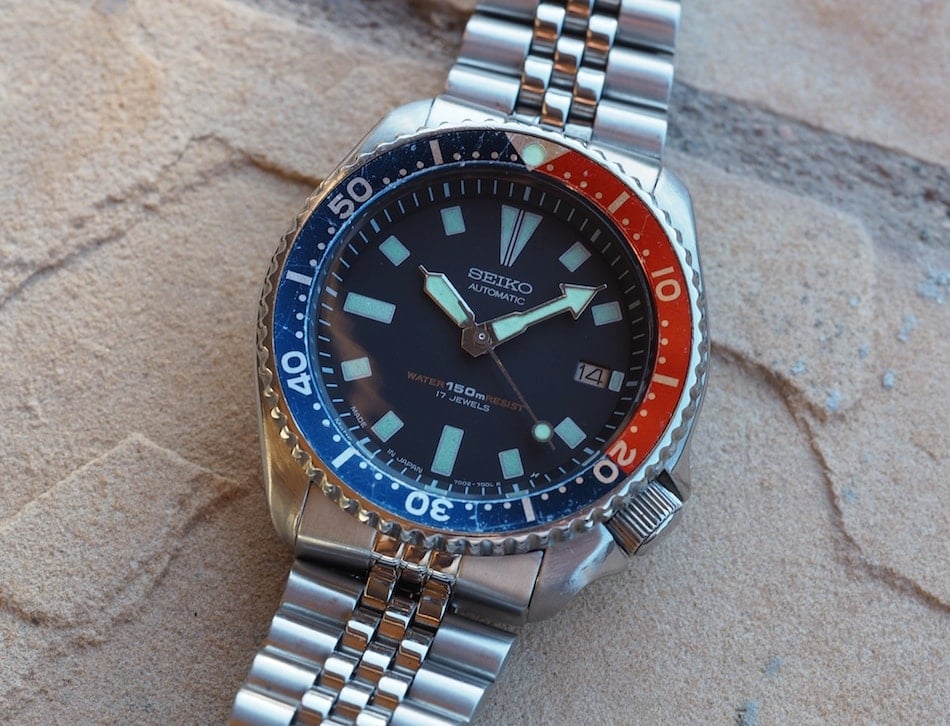
One of the great buyer’s references on the Seiko 7002 diver still exists from 2009 on Watchuseek. It’s one of the few aged watch guides that has stood the test of time. If you scroll through the lengthy posting, you will note that there were many 7002 variants. The watch started as a 150m diver and evolved into a more robust 200m instrument namely due to changes in construction around its crystal. The version I ultimately purchased is a 7002-700J variant, which was JDM only and came with the uber cool faded Pepsi-style bezel you see here. It also differs from some versions by containing the jewel count on the dial. It was delivered on a later OEM rubber strap, but I decided to fit a comfortable older and rattle-strap Seiko jubilee. In any case, we’ll purely focus on this variant of the 7002. The guide I’ve mentioned is exhaustive and also provides a great overview of the many pitfalls to consider when conducting a search for one of these pieces.
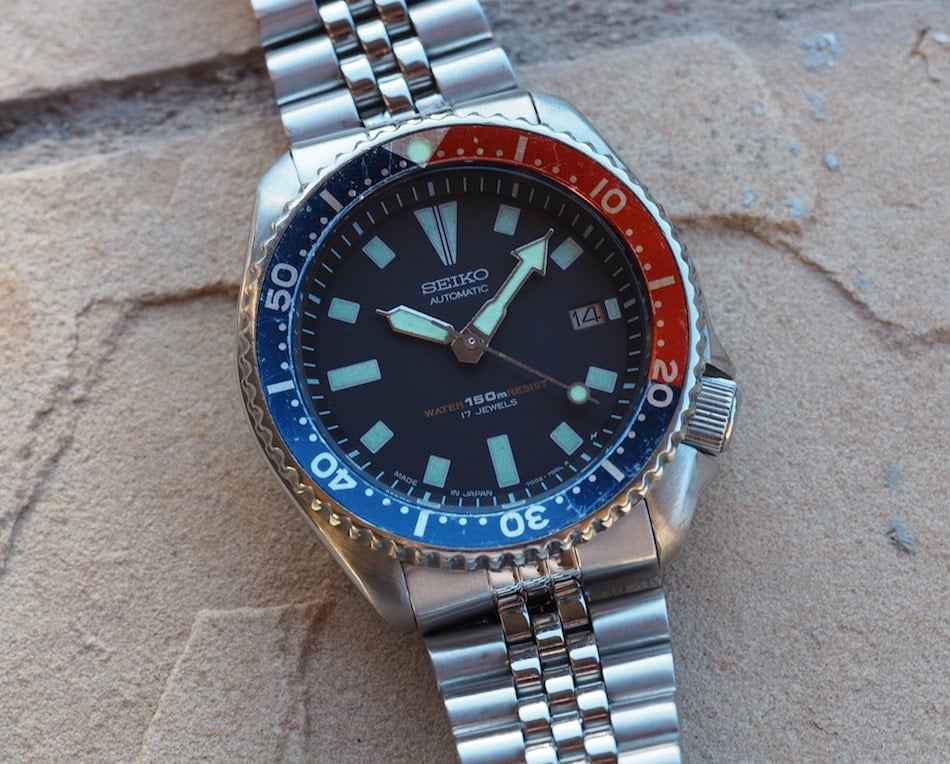
Here are just some of the examples… When it comes to the Seiko 7002 diver, there are versions with black bezels, Pepsi bezels, 150m, and 200m depth ratings. There are flat bezel inserts, inwardly angled inserts, and altogether incorrect bezels. Case backs changed over the years and there are myriad dials. There are laods of fake dials too that contain blatantly wrong dial codes and then there are those that contain the correct verbiage, but the font is clearly not original. Lume is particular on the 7002 as well. First, it doesn’t completely cover the lume plots (not odd for Seiko) and it’s known to be of lesser quality when compared to the models before and after it. It often turns grey and a little grainy like you see here. Apparently, bright green is a good tell that something has been altered. What I’ve briefly mentioned are just a few of the potential hazards to to consider when looking for a 7002. Trust me, do your reading beforehand or you can truly end up with a watch that is a mixture of all sorts of original and aftermarket 7002’s. These watches often lived in humid environments, so damaged pieces were frequently divided up for their salvageable parts.
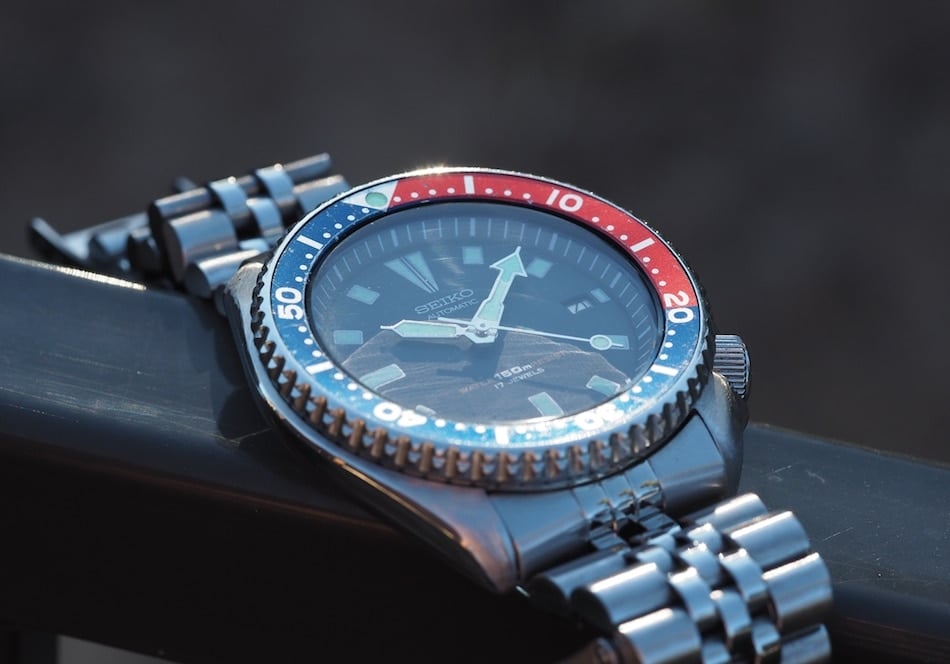
So, how did I stumble upon this very model? To be honest, I simply wanted a correct one and while that might not sound like a tall order, it can be with the 7002. You see, the 7002 could be considered as the grandpappy of modder watches. Memorize or have the aforementioned guide opened in one window and then head over to eBay and have a gander. I’d wager that 99% of the watches are either heavily modded or have aftermarket parts meant to look original. For an inexpensive neo-vintage watch that was produced in serious numbers, finding an original 7002 is far more difficult than it should be. My first 7002 wasn’t modified, but it was so badly beat up that my watchmaker threw it away – truly. (To be fair, it was so cheap that I should have known.) He also remarked that 7002 movements were disposable in his eyes and that Seiko really lost the plot. After about 5 years, I waded back into the pool. My second 7002 looked great from afar (the pics were crappy) and was about $100. It runs beautifully, but it’s a hodgepodge of all sorts of 7002’s. So, finally, the third time was the charm.
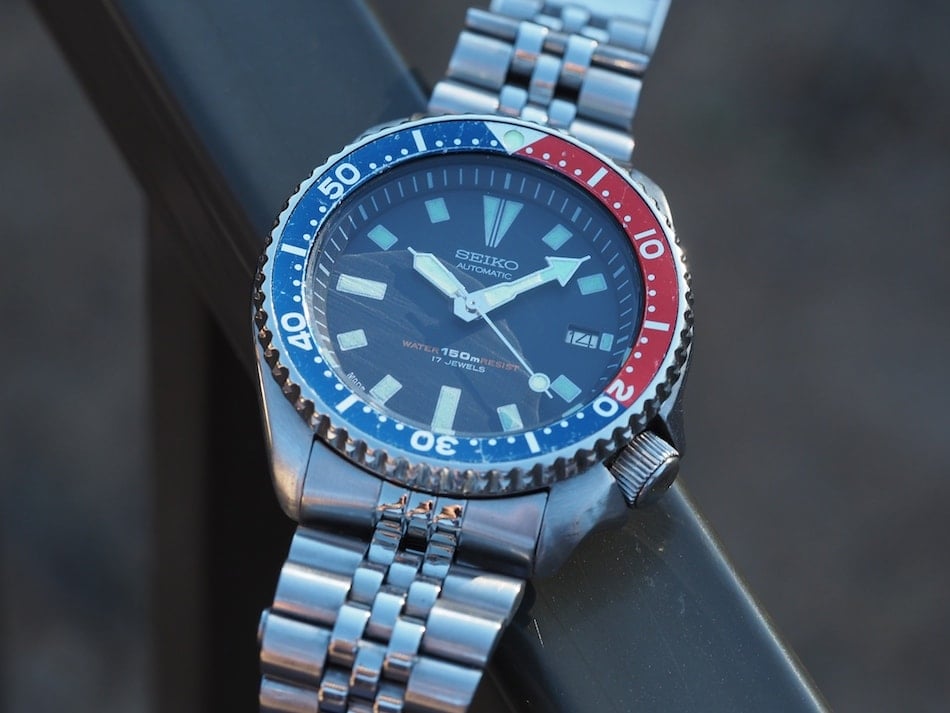
Aside from having a desire to own at least one representative example of every major diver from the Japanese brand, there was another reason that I wanted to pick up a Seiko 7002 diver. That reason was and still is Gerard. Some of you may know Gerard from his days of owning a watch shop (he’s had some serious gems over time), but you should know something else about him. He’s a bit of an eccentric and if RADwood ever makes its way to the Netherlands, he’d likely be a participant. Whether it’s 90’s Saabs, a mid-aughts Ducati Multistrada, or a Breitling Pluton, Gerard is probably an owner or interested. He likes underdogs and for that reason, I guess he likes the Seiko 7002 and he’s developed a penchant for finding them for a song. Plus, he’s pretty laid back about whether they’re original or not. Whatever the case, I’m blaming it on him for my journey to find a decent one.
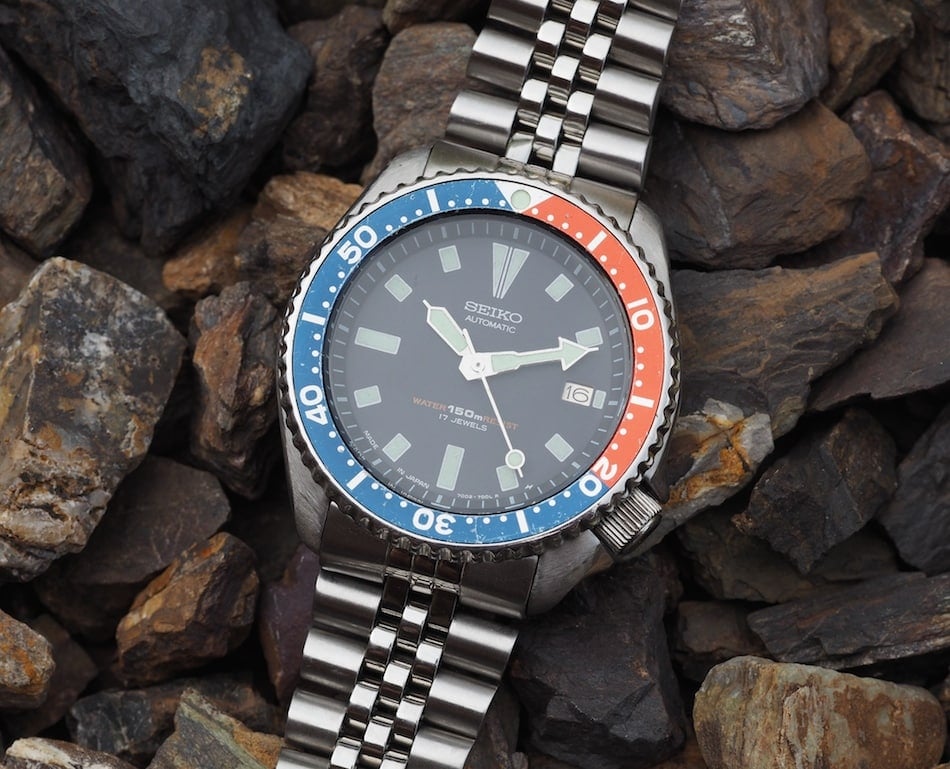
Perhaps due to its cost-cutting nature, the Seiko 7002 diver lags behind other retired dive watches from the brand in price, but I find this to be a bit of a shame. The omission of the day wheel actually gives the 7002 one of the cleaner looks within the entire chronology. There’s very little to distract the eye and I simply find it more balanced than the later SKX007 or earlier 6309-7290. Credit the slim 12:00 marker as well as basic rectangular indices at each hour for contributing to the good clean looks as well. This example has kept its lume in decent shape – Seiko was up to something with its Lumibrite at this time, as most turn grayish – especially if moisture enters the fray. Take a look down at the base of the dial or on the tsunami-emblazoned case back and you’ll see the “Daini” factory lightning bolt. This 7002 was made in 1994 and that had to be at the end of Seiko adorning their watches with the factory symbols we enjoy so much on vintage models.
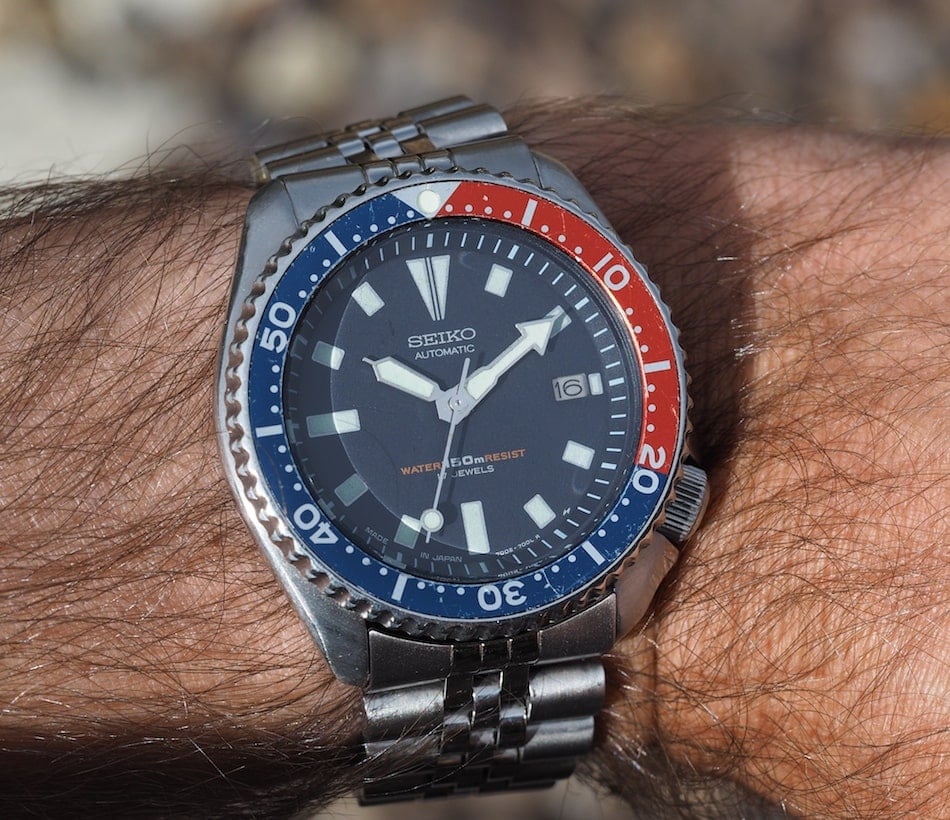
At 41mm in diameter, 45mm in length and 13mm thick, the Seiko 7002 diver is supremely comfortable. It feels solid, but paired with the lightweight bracelet; it’s fantastic on the wrist – lithe and like your favorite pair of loafers (or perhaps white St. Laurent terry cloth slides if you’re our watchmaker Paul). Like most Seiko’s – especially those that are vintage – it catches eyes and many think it’s something far more exotic. I’ve also found this recently serviced 7002 to keep great time – even after the fall! Like most Seiko’s, the 7002 can’t be handwound, but it does feature a quick set date when pulling the screw-down crown out to the first stop. Likewise, the uni-directional bezel clicks with reassuring solidity.
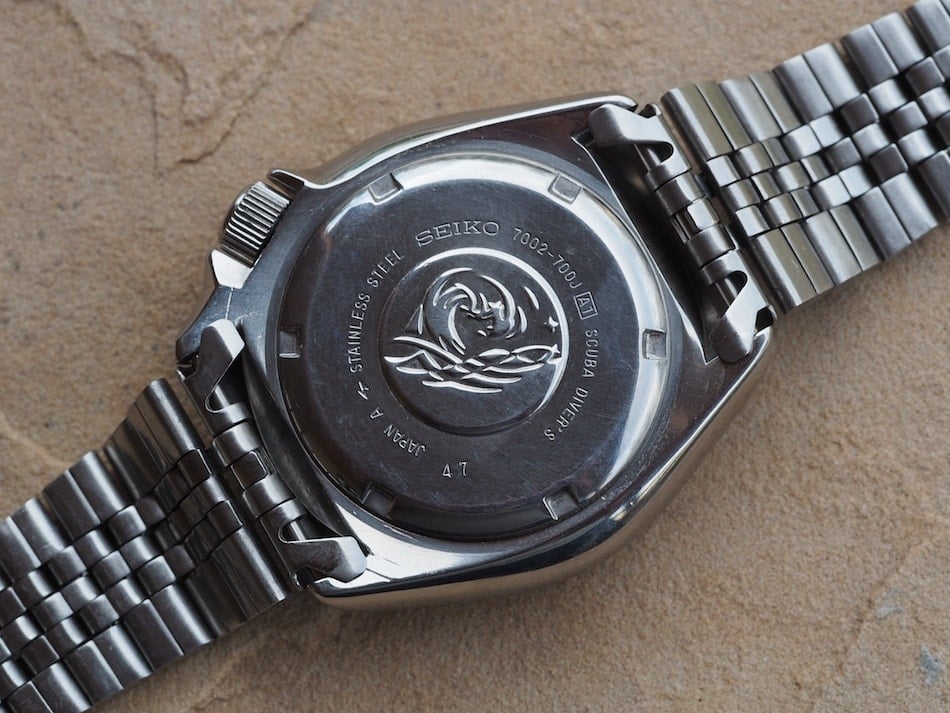
Like I mentioned, finding a truly unmolested Seiko 7002 diver can be a serious chore. Still, when a decent one is found, take pleasure in the fact that they often still cost less than a new (old stock?) SKX007. At $150-250 for a well-sorted example, I consider this a real bargain and with the continued rise in popularity of older Seiko’s, prices will almost surely continue to rise. If you’re after a running example that may have simply had its wabi’d hands or roughed-up bezel insert replaced, 7002’s can often be found at flea markets or on places like Craigslist for as little as $50. Just ask Garage Sale Gerard as he’s found a number of cool rough and tumble pieces that, while not perfectly correct, provide a high “smiles per mile” feeling. I’ve seen him pair all kinds of rustic straps with these equally weathered watches and they punch well above their weight class looks wise.
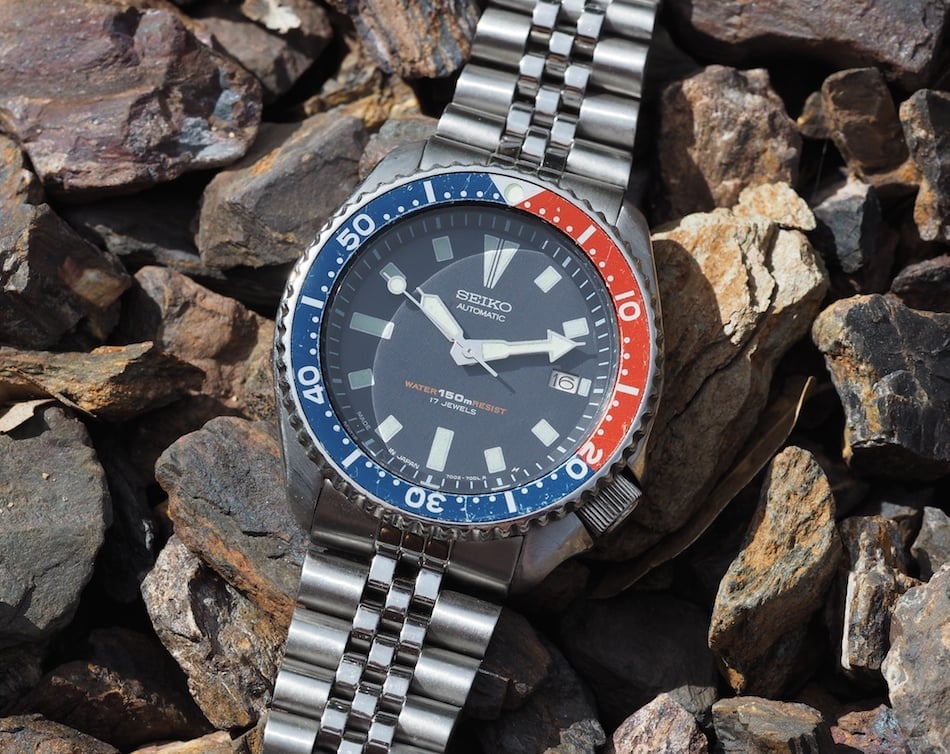
The Seiko 7002 diver is a worthy addition to your vintage diver collection. It’s getting old enough that most have developed a nicely aged look. Plus, without a day display, it’s one of Seiko’s cleaner designs. And finally, as we’ve mentioned repeatedly, there’s a cheap thrill to be had here if the thrill of the hunt for a proper one is your bag. Take my word for it, though, do your homework before buying, and perhaps you won’t have to cycle through three pieces before finding the right specimen. Until next time…











